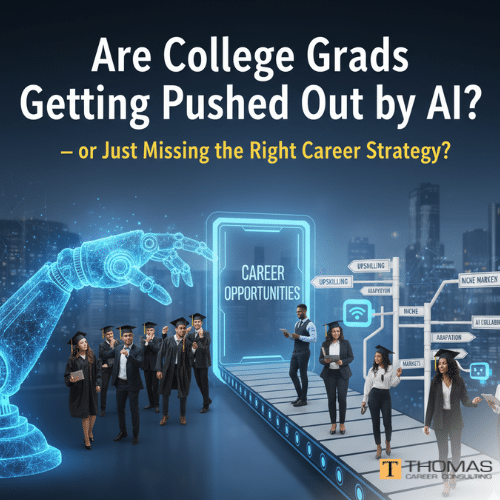A few years ago, I met a young woman named Sarah who had just graduated from a top-tier university. She was bright, articulate, and ambitious. Her degree was in marketing, her GPA impressive, and her internship experience solid. Yet, after six months of job applications, she had only received one interview and no offer.
She sat across from me on Zoom, deflated. “It feels like every job I apply to either disappears or goes to someone with ten years of experience. Maybe AI really is replacing us,” she said.
It’s a common fear today. Artificial intelligence has changed hiring, reshaped industries, and automated parts of the job search itself. But the truth is more nuanced. Most recent graduates aren’t being pushed out by AI, they’re being filtered out because they haven’t learned how to navigate a hiring process that now blends human decision-making with algorithmic screening.
The problem isn’t that they lack talent or drive. It’s that they lack a strategy.
And that’s exactly where thoughtful career counseling and professional résumé writing come in.
The New Job Market Reality
The job market of 2025 isn’t the one your parents graduated into. Job descriptions evolve almost monthly, and entry-level roles often demand two to three years of “experience.” Add AI-powered Applicant Tracking Systems (ATS) scanning every résumé for keywords, and you can see why so many qualified graduates never make it past the first round.
At Thomas Career Consulting, I’ve seen this play out with hundreds of early-career professionals who are smart, hardworking, and capable, but invisible to employers.
AI isn’t the enemy, but it has changed the rules of the game. To compete, you need more than a degree. You need clarity, storytelling, and a strategy that bridges who you are with what employers are actually looking for.
From Panic to Plan: How Career Counseling Changes Everything
When graduates come to me, they’re often juggling anxiety, self-doubt, and a stack of unanswered applications. Career counseling helps them slow down, step back, and figure out what’s really going on.
The process starts with self-knowledge, something most college programs don’t teach. We look at values, personality, and strengths using assessments like the Strong Interest Inventory or Myers-Briggs Type Indicator (MBTI). These tools uncover patterns that help clients see not just what they can do, but why certain roles fit better than others.
From there, we connect that insight to the real world, market trends, hiring shifts, and the ways AI is transforming recruitment. This is where strategy meets self-awareness.
You can’t build a meaningful career from guesswork. But when you understand yourself and the market, everything changes.
That’s when Sarah’s story started to shift.
Sarah’s Turning Point: A Case Study in Reframing
After our first few sessions, it became clear that Sarah didn’t want a traditional marketing analyst job. What excited her most was storytelling, campaigns, brand narratives, and social strategy. But her résumé focused entirely on data and analytics because she thought that’s what employers wanted.
We restructured her résumé to tell the story of a creative strategist with measurable impact. Instead of listing tasks, we showcased accomplishments:
- Developed a student-led campaign that increased engagement by 42%
- Managed a cross-campus social initiative adopted by the university’s communications department
That narrative shift changed everything. Within a month, she landed three interviews and eventually a full-time role with a creative agency in Philadelphia.
It wasn’t AI that had been holding her back. It was a lack of strategy and storytelling.
The Power of a Professionally Written Résumé
Most job seekers underestimate how much their résumé determines their fate. It’s not just a summary of experience; it’s a marketing tool. And if it doesn’t connect to the reader within seconds, it won’t make it past the initial screen.
As a Certified Professional Résumé Writer (CPRW), I see too many graduates relying on templates or AI tools that produce generic documents. Those tools can help you get started, but they don’t understand nuance, tone, or strategy.
Your résumé needs to align with your goals, not just your history. It should highlight your differential factors, the unique strengths, accomplishments, and perspectives that set you apart from equally qualified candidates.
That’s why professional career services matter. A well-crafted résumé can turn a silent inbox into interview invitations.
If you’re unsure where to start, explore my career counseling and résumé writing services, where I work with clients nationwide to position them for success.
Career Transition Coaching: For Grads Who Want to Pivot
Some graduates realize, sometimes painfully, that the path they’ve prepared for isn’t the one they actually want. That’s not failure, it’s clarity.
Career transition coaching helps people take what they’ve learned and reposition it. I’ve worked with psychology majors moving into user experience, teachers pivoting into corporate training, and even engineers transitioning to tech sales.
The process involves reflection, rebranding, and a deep dive into transferable skills. Through guided sessions, assessments, and personalized strategy, clients learn to talk about their experiences in a way that employers understand and value.
That’s what professional career development services are really about: transforming confusion into confidence.
What AI Can’t Replace: Human Insight
There’s a lot of anxiety about automation, but here’s what AI can’t do, it can’t tell your story.
It doesn’t know why you stayed late to finish a group project that mattered, or what motivated you to switch majors your junior year. It can’t sense your curiosity, your persistence, or your personal growth.
But a certified career counselor can.
When I work with clients, my goal isn’t to make them sound perfect. It’s to make them sound real. I help uncover those “golden nuggets” in their backgrounds, the overlooked details that reveal value, character, and potential.
Employers respond to authenticity. They want to know who you are, not just what you’ve done.
The Reality of the Modern Job Search
Today’s hiring process is a maze of algorithms, job boards, and digital screenings. It can feel like shouting into the void. But success still comes down to connection – human to human.
That means:
- Crafting résumés and cover letters that reflect your personality and purpose
- Building an engaging LinkedIn profile that recruiters can find and trust
- Preparing for interviews so you speak clearly about your story and strengths
- Using AI tools wisely, but not depending on them to define your professional identity
These are all areas where guided career coaching makes a measurable difference.
If you’re curious where to begin, you can take my free Career Satisfaction Quiz. It’s a quick, reflective tool to help you assess where you are, and where you might want to go next.
From Overwhelmed to Empowered: Building Confidence Again
For many young professionals, the hardest part isn’t writing a résumé, it’s rebuilding confidence after rejection.
Career counseling isn’t therapy, but it can be deeply restorative. Through structured conversations and honest reflection, clients learn to recognize their achievements, confront their self-doubt, and approach the job search with renewed focus.
I’ve had clients tell me that this process didn’t just help them land interviews, it helped them see themselves differently.
That shift in mindset is often the real turning point.
A Human-Centered Approach in a Tech-Driven World
At Thomas Career Consulting, everything begins with listening. Every client, whether a new graduate, mid-career professional, or executive, gets a tailored approach. We meet virtually, but the process feels personal.
You won’t get canned advice or cookie-cutter documents. Instead, you’ll get a partnership built on collaboration, strategy, and trust.
This is career work for the modern era: informed by technology, grounded in psychology, and powered by genuine human connection.
You can learn more about this approach on my YouTube channel, where I share insights about résumés, interviews, and navigating transitions. You can also follow along on Instagram or connect with me on LinkedIn for ongoing tips and perspective.
A Final Word for the Class of Now
If you’re a recent graduate, you’re not being pushed out by AI; you’re stepping into a world that rewards adaptability, curiosity, and clear communication.
Technology may have changed how hiring works, but it hasn’t changed what makes people hireable. Employers still look for authenticity, initiative, and stories that make sense.
So before you give up on the job search, ask yourself:
- Does my résumé tell a clear story about who I am and what I can offer?
- Am I targeting the right roles for my skills and values?
- Have I reached out for professional guidance to help me see what I might be missing?
If your answer is no, then you’re not behind; you’re just at the starting line of a more intentional process.
And if you’re ready to begin, schedule a complimentary consultation. Let’s turn confusion into clarity and put strategy behind your next career move.
Because in this new world of work, success isn’t about competing with AI. It’s about being the kind of human no machine can replace.




Recent Comments